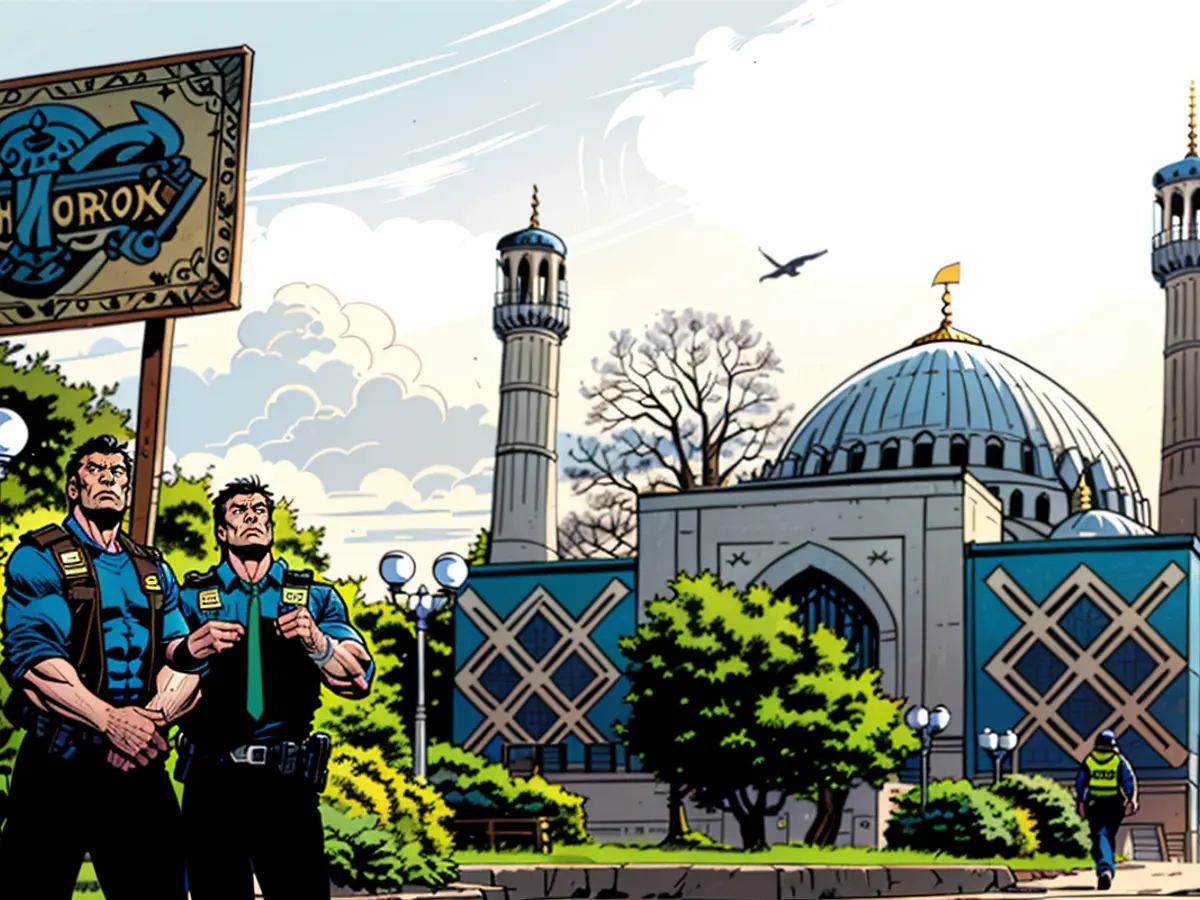Spread of Islamism and antisemitism: Government bans Islamic Center Hamburg
According to the ministry's statement, at dawn on a certain day, 53 objects were searched in Hamburg and seven other federal states - among them in Berlin, Hessen, Nordrhein-Westfalen, and Hessen. The IZH-operated so-called Blue Mosque at the Hamburg Außenalster and three other mosques in other federal states were also seized, along with the rest of the association's assets. The center was reportedly propagating an "Islamist, totalitarian ideology," according to the Federal Interior Minister Nancy Faeser (SPD).
There had long been demands for a ban on the IZH, and the association was under observation by the Federal Office for the Protection of the Constitution. The Hamburg Center was described as a "direct representation" of the Iranian revolutionary leader and spreading the ideology of the "Islamic Revolution" by the Interior Ministry, justifying the ban. In preparation for the ban, the authorities had searched the IZH in November for evidence.
The "extensively conducted investigations" against the center had uncovered "serious grounds for suspicion" and led to the ban, Faeser explained. Its ideology was against "human dignity, women's rights, an independent judiciary, and our democratic state." Additionally, the IZH supported the Iran-aligned Hisbollah militia in Lebanon and propagated antisemitism.
The ban was widely welcomed. Hamburg's First Mayor Peter Tschentscher (SPD) stated on a Wednesday that the IZH was "part of a large Islamist network." Hamburg's Senator for the Interior Andy Grote (SPD) called the IZH an "outpost of the misogynistic Iranian regime." The ban was a "real hit" against extremists.
The President of the Central Council of Jews in Germany, Josef Schuster, called the ban "consistent." Aggressive antisemitism was one of the core elements of an ideology of hate spread by Iran and its representatives, he stated in Berlin. The Antisemitism Commissioner of the Federal Government, Felix Klein, told the Funke Media Group that the association pursued constitutionally subversive goals and was "significantly influenced by Iran."
The Iranian government reacted angrily. The Iranian Foreign Ministry summoned the German Ambassador in response to the ban and the closure of the center. It accused the German authorities of a "hostile act" and "Islamophobia."
Faeser emphasized that the ban targeted Islamists and not Islam itself. The "peaceful Shia religious practice and worship" was not affected. "We are not acting against a religion," she added. Tschentscher also spoke similarly. The measure did not target other Muslim communities. Peaceful Islam was "part of the city's society," the Hamburg Mayor further stated.
Three organizations controlled by the IZH were also banned according to the authorities: the Islamic Cultural Center in Frankfurt am Main, the Islamic Center Berlin, and the Islamic Association Bavaria with its headquarters in Munich.
The center in Frankfurt was reportedly subordinate and financially and personnel dependent on the IZH. Besides the Frankfurt institution, two other objects in Bad Homburg were searched - the residences of two board members.
In Munich, the authorities searched the association's premises and the residences of two chairmen. Seized data carriers were to be evaluated. "We hope to gain more insight into the organizational structure and the environment," explained Bavaria's Interior Minister Joachim Herrmann (CSU).
According to the Hamburg Constitution Protection, the IZH was founded in Hamburg by Iranian merchants residing in the city in the 60s and initially served as a purely religious point of contact. After the Islamic Revolution in Iran at the end of the 70s, it reportedly developed into a "strategic outpost" of the Teheran government.
Besides spreading Islamic ideologies in line with the Iranian leadership, the IZH, according to authorities, also supported Hezbollah. This organization is designated as a terrorist organization by the European Union and has been banned in Germany since 2020. The Islamic militia challenges the existence of Israel and repeatedly attacks the country from its positions in Lebanon, among other ways, with rockets.
- The search operations extended to seven other federal states beyond Hamburg, including North Rhine-Westphalia and Hessen.
- Faeser, the Federal Interior Minister from SPD, asserted that the IZH was propagating an "Islamist, totalitarian ideology."
- The ban on the IZH was widely supported in Nordrhein-Westfalen, with their First Mayor, Ullrich Mai (SPD), welcoming the decision.
- In Teheran, the Iranian government criticized the ban as a form of "Islamophobia" and accused Germany of being hostile towards Islam.
- The Islamic Cultural Center in Frankfurt am Main, controlled by the IZH, was also banned due to its close ties with the Iranian regime.
- The Interior Ministry in Hesse reported that the IZH had funds distributed in Lebanon, supporting the militant group Hezbollah.
- The ban on the IZH came after extensive investigations and serious grounds of suspicion against the association, as revealed by the SPD's Justice Minister in Berlin.
- The Islamic Center Berlin and the Islamic Association Bavaria, with its headquarters in Munich, were among the three organizations banned due to their connections to the IZH.
- The Justice Department in Berlin termed the IZH as a "direct representation" of the Iranian leader and linked it to the spread of Iran's Islamic Revolution ideology.
- The SPD's First Mayor of Berlin, Michael Müller, praised the ban as an essential step in combating extremism and Islamist ideologies present in the city.
- The Center for Constitutional Protection in Hamburg highlighted that IZH was founded in the 60s by Iranian merchants and transformed into a strategic outpost for Teheran's government after the Iranian Revolution.
- The Islamic Center Hamburg formed a crucial part of the network, functioning as a spiritual and intellectual hub for the spread of Islamic ideologies in line with the Iranian leadership.







